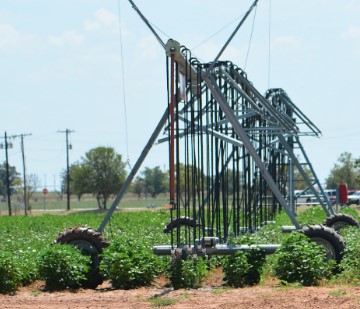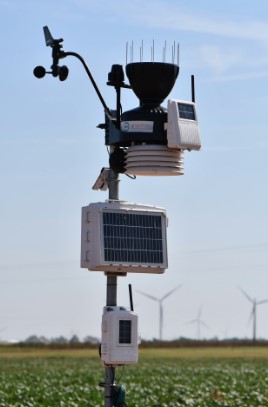By Kay Ledbetter
Texas A&M AgriLife is developing an inexpensive and easy-to-use mobile app and irrigation management system to help agricultural producers increase water-use efficiency and continue producing cotton.
The new project is funded by the Texas A&M Water Seed Grant Initiative and is titled “A Novel Sensor- and Crop-Model-Based Decision Support Tool for Efficient Irrigation Management.”
The app is being developed in the Texas Rolling Plains region, which produces about 13% of the state’s cotton, said Srinivasulu Ale, Ph.D., Texas A&M AgriLife Research geospatial hydrologist and lead investigator on the project in Vernon.
Yet that cotton production faces challenges from recurring droughts and declining groundwater levels in the Seymour Aquifer. Furthermore, projected warmer and drier weather in the future will require larger groundwater withdrawals to meet crop water demands, Ale said.
To sustain cotton production in this region, he said, producers must adopt water-use efficient irrigation strategies.
Design and development of mobile app
Joining Ale on the project will be Curtis Adams, Ph.D., AgriLife Research crop physiologist; Emi Kimura, Ph.D., Texas A&M AgriLife Extension Service agronomist; and Yubing Fan, Ph.D., AgriLife Research postdoctoral research associate, all in Vernon. Also, Jim Wall, Ph.D., executive director, and Keith Biggers, Ph.D., director of computing and information technology, both at the Texas A&M Center for Applied Technology, College Station, will provide expertise.
The project is partnering with the Gateway Groundwater Conservation District, Quanah, and the Rolling Plains Cotton Growers Inc., Stamford.
“Our goal is to deliver a product to cotton producers that can greatly improve their irrigation management, but is simple and accessible,” Adams said.
Most irrigation support tools have limitations that make them less useful to producers in some way, he said, and this project’s goal is to improve upon existing technologies using a novel approach.

Increasing water-use efficiency in cotton will be the focus of a new study at the Texas A&M AgriLife Research and Extension Center at Vernon. (Texas A&M AgriLife photo by Kay Ledbetter)
“Our app will collect crop information from sensors mounted on center pivot systems, use weather data from online sources, and provide a number of potential combinations of real-time updated deficit- or full-irrigation schedules and economic outcomes,” Biggers said. “Producers can choose an irrigation strategy that best suits their well capacities and expected returns.”
This field information will be used in conjunction with the historic and projected short-term future weather data over the growing season in crop and economic models to estimate projected cotton yield, irrigation levels and net returns under different irrigation management strategies.

Weather data collected in the field over the growing season will be used to help identify the proper irrigation management strategy. (Texas A&M AgriLife photo by Kay Ledbetter)
Considering short- and long-term weather forecasts
“To our knowledge, none of the existing apps use projected short-term weather forecasts in generating real-time irrigation schedules, and our proposed app does that,” Ale said.
Once validated using data from a field experiment, the proposed system will be further evaluated by selected producers under different crop conditions, soils, irrigation capacities and weather.
Wall said their plan is to have the app developed by the end of this year, test it in producers’ fields in 2021 summer, and release it in fall 2021.
Kimura estimates if producers adopt the tool on 200,000 acres of irrigated land in the Rolling Plains, it could potentially save millions of gallons of groundwater and extend the economic life of the Seymour Aquifer.
“But we don’t think its viability will be limited to the Rolling Plains,” Ale said. “We expect the proposed system to allow modifications to include other row crops and for use in other crop production regions of Texas and beyond.”
Source : tamu.edu